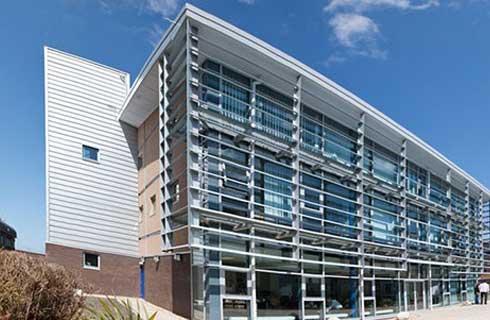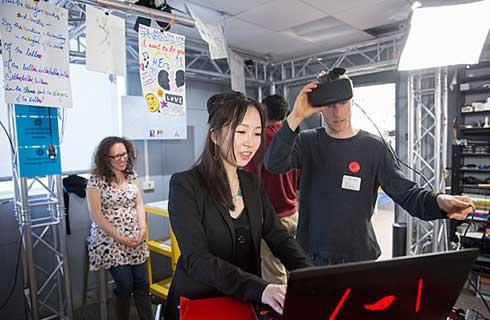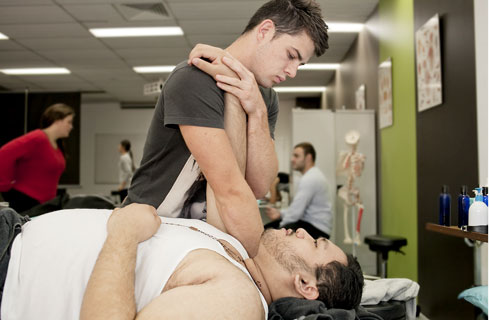理学学士(荣誉)学位课程-交流与咨询研究
BSc (Hons) Communication and Counselling Studies

学历文凭
Bachelor Degree with Honours

专业院系
Belfast Campus

开学时间

课程时长

课程学费

国际学生入学条件
IDP—雅思考试联合主办方

雅思考试总分
- 雅思总分:
- 托福网考总分:
- 托福笔试总分:
- 其他语言考试:
CRICOS代码: P9B4
申请截止日期: 请与IDP联系 以获取详细信息。
课程简介
Offering practical skills and robust understanding of the importance of effective communication in counselling, health and related contexts. This interdisciplinary and skills-focused degree programme: •Provides students with a theoretical, empirical and experiential understanding of applied communication studies within interpersonal, professional, social and cultural contexts. •Offers students an introduction to counselling theories, skills and ethical-decision-making. •Equips students with knowledge to identify opportunities to plan and undertake interdisciplinary research in the fields of communication, counselling studies and mental health. •Develops students’ organisational, observation, analytical and reflective skills for continuing personal and professional development, all of which are a prerequisite for training or working as counsellors, psychotherapists or other healthcare professionals. •Teaching is by an award-winning team of lecturers, researchers and practitioners with experience in the applied field of mental health, including counselling, psychotherapy and health communication. •Holds Advanced Training Status for counselling studies from the National Counselling Society (NCS).<br><br>The emphasis in this course is on developing an understanding of the emotional and psychological development of the person within family, social and cultural settings. The course also emphasises the importance of rigorous and reflective ethical decision-making practices for working with vulnerable populations and clients within counselling and healthcare settings. Students take a range of core and optional modules which provide a firm grounding in theories, practices, skills and capacities needed for effective communication in interpersonal and professional contexts. Each module combines lectures, seminars and group tasks to facilitate students gaining a comprehensive intellectual knowledge, while learning from experience.
相关申请
 预科
预科 奖学金
奖学金 实习机会
实习机会 在校学习
在校学习 跨境学习
跨境学习 校园授课-线上开始
校园授课-线上开始 在线/远程学习
在线/远程学习
开学时间&学费
学费信息仅供参考,请与IDP联系以获取详细信息
| 开学时间 | 时长 | 学费 | 地点 |
|---|
学校排名

世界排名601
数据源:
泰晤士高等教育世界大学排名
关于奥斯特大学

阿尔斯特大学是北爱尔兰最大的大学,在贝尔法斯特、科尔雷恩、麦基和乔丹斯托设有四个不同的校区。该校在伦敦和伯明翰市还设有两处教学地点--这些校区共同为学生提供一系列优质的课程选择,除此之外还提供远程和网上学习方式。阿尔斯特大学因学生满意度和卓越的学术而享有极高的声誉,成为《泰晤士报和星期日泰晤士报优秀大学指南》(Times and Sunday Times Good University Guide)''年度优秀大学''五所入围大学之一就是很好的证明。在学生体验和教学质量方面,该校也跻身英国院校前30名。总体而言,阿尔斯特大学的地位最近得到了进一步的提升,已跻身英国院校整体排名50强。阿尔斯特大学的毕业生就业率在英国名列前茅,94%的毕业生能够在离开该校后半年内就业或继续深造。该校大多数课程都经过专业认证,学生可通过实习获得实际工作经验。屡获殊荣的职业发展中心为学生提供支持,让学生能够信心十足地在职业道路上取得成功。阿尔斯特大学的校园配有现代化的设施,给所在的城镇带来重要的积极影响,该校也因为拥有这些优质的校园而倍感自豪。该校还通过不断建设精良的新设施和推出新举措来发展校园,旨在使学生及所在社群团结一致,共同寻求成长和发展。令阿尔斯特大学自豪的是,该校拥有一个热情而多元化的国际学生群体,世界各地100多个国家的学生来到阿尔斯特大学学习。
本校相关课程

设计学士学位(荣誉)-动画
学历文凭
Bachelor Degree with Honours
开学日期
课程费用总额


MA Animation
学历文凭
Masters Degree (Taught)
开学日期
课程费用总额


Master of Science in Art Therapy
学历文凭
Masters Degree (Taught)
开学日期
课程费用总额


文化遗产和博物馆研究文学硕士
学历文凭
Masters Degree (Taught)
开学日期
课程费用总额


文学学士(荣誉)-建筑
学历文凭
Bachelor Degree with Honours
开学日期
课程费用总额


Master of Fine Arts in Design
学历文凭
Masters Degree (Taught)
开学日期
课程费用总额

其他相关课程

传播学学士(新闻学)
 悉尼科技大学
悉尼科技大学学历文凭
Bachelor Degree
开学日期
课程费用总额


数字媒体与传播学士学位
 威斯敏斯特大学
威斯敏斯特大学学历文凭
Bachelor Degree with Honours
开学日期
课程费用总额


MA Digital Media and Society
 卡迪夫大学
卡迪夫大学泰晤士高等教育世界大学排名:204
学历文凭
Masters Degree (Taught)
开学日期
课程费用总额


电影,电视和广播文学(荣誉)文学士学位(基础入学)
 中央兰开夏大学
中央兰开夏大学学历文凭
Bachelor Degree with Honours
开学日期
课程费用总额


新闻,媒体和英语文学(荣誉)文学士学位
 卡迪夫大学
卡迪夫大学泰晤士高等教育世界大学排名:204
学历文凭
Bachelor Degree with Honours
开学日期
课程费用总额


新闻学学士-国际研究学士
 伍伦贡大学
伍伦贡大学泰晤士高等教育世界大学排名:247
学历文凭
Dual Degree
开学日期
课程费用总额










